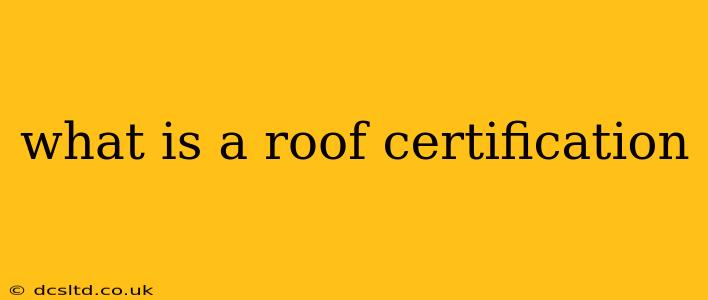A roof certification isn't a single, universally recognized document. Instead, it represents the outcome of a professional roof inspection performed by a qualified and often insured roofing contractor or inspector. This inspection assesses the condition of your roof, identifying any damage, deterioration, or potential problems. The resulting report, sometimes called a roof certification, acts as official documentation of the roof's condition at a specific point in time. This can be incredibly valuable for various reasons, from selling a house to securing insurance.
What Does a Roof Inspection Involve?
A thorough roof inspection typically includes a visual examination of all aspects of the roofing system, including:
- Shingles/Tiles: Checking for missing, damaged, cracked, or curling shingles or tiles. The inspector will look for signs of wear and tear, granule loss, and potential leaks.
- Flashing: Inspecting the flashing around chimneys, vents, skylights, and other penetrations to ensure proper sealing and prevent water intrusion.
- Underlayment: Assessing the condition of the underlayment, a waterproof membrane beneath the shingles, to detect any tears or damage.
- Gutters and Downspouts: Checking for clogs, damage, or proper drainage to prevent water buildup around the foundation.
- Chimney and Ventilation: Evaluating the condition of the chimney and ensuring proper ventilation to prevent moisture buildup.
- Structure: Inspecting the roof's structural components, including rafters, trusses, and sheathing, for signs of rot, decay, or damage.
The inspector will use specialized equipment, such as binoculars or drones, to get a comprehensive view, especially on larger or hard-to-reach areas.
Why is a Roof Certification Important?
A roof certification offers several significant advantages:
-
Selling a Home: A positive roof certification provides peace of mind to potential buyers, demonstrating that the roof is in good condition and reduces the likelihood of disputes or negotiations during the sale. It can significantly enhance the property's value and marketability.
-
Insurance Claims: If you experience roof damage due to a covered event (like a storm), a pre-existing certification can support your insurance claim by documenting the roof's condition before the incident. This helps demonstrate the extent of damage attributable to the covered event, facilitating a smoother claims process.
-
Preventative Maintenance: A certification can highlight potential problems early on, allowing you to schedule necessary repairs or maintenance before they escalate into larger, more expensive issues. This proactive approach extends the life of your roof and saves money in the long run.
What Information Does a Roof Certification Typically Include?
A typical roof certification report will include:
- Date of Inspection: Clearly indicating when the inspection was performed.
- Inspector's Qualifications: Detailing the inspector's credentials and experience.
- Roofing Materials: Specifying the type of roofing materials used.
- Roof Age: Estimating the age of the roof.
- Condition Assessment: A detailed description of the roof's overall condition, including any damage or defects found.
- Photographs: Visual documentation supporting the assessment.
- Recommendations: Suggestions for repairs, maintenance, or replacements, if necessary.
- Estimated Lifespan: An estimated remaining lifespan of the roof based on its current condition.
What is the Difference Between a Roof Inspection and a Roof Certification?
While the terms are often used interchangeably, there's a subtle difference. A roof inspection is the process itself, while a roof certification is the written documentation that results from a thorough inspection. The certification provides official confirmation of the inspector's findings.
How Much Does a Roof Certification Cost?
The cost of a roof inspection and subsequent certification varies depending on several factors, including the size of the roof, its accessibility, the complexity of the inspection, and the geographic location. It's best to obtain quotes from several reputable roofing contractors or inspection services to compare prices.
How Often Should I Get a Roof Certification?
The frequency of roof certifications depends on various factors, including the age of your roof, its condition, and the climate in your area. However, a professional inspection every 3-5 years is generally recommended for preventative maintenance. More frequent inspections might be necessary in areas with harsh weather conditions or if you notice signs of damage to your roof. For homeowners selling their property, a pre-listing inspection is almost always recommended.
By understanding the importance and process of roof certifications, homeowners can protect their investment, make informed decisions, and ensure the longevity and safety of their property. Remember to always choose a reputable and qualified roofing professional for your inspections.
